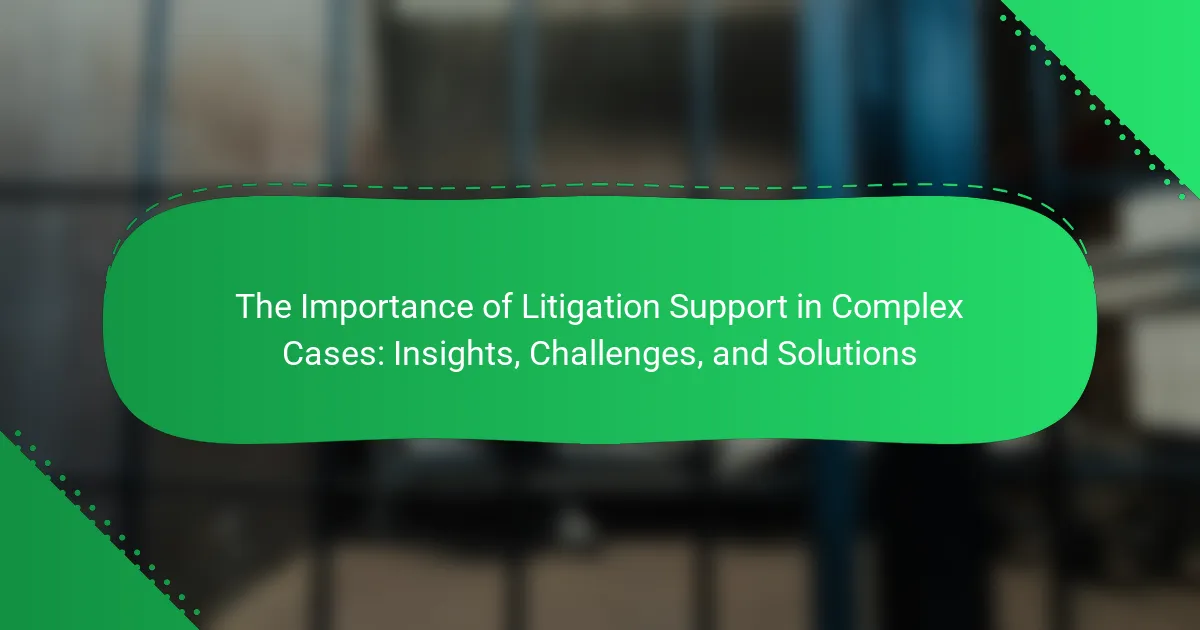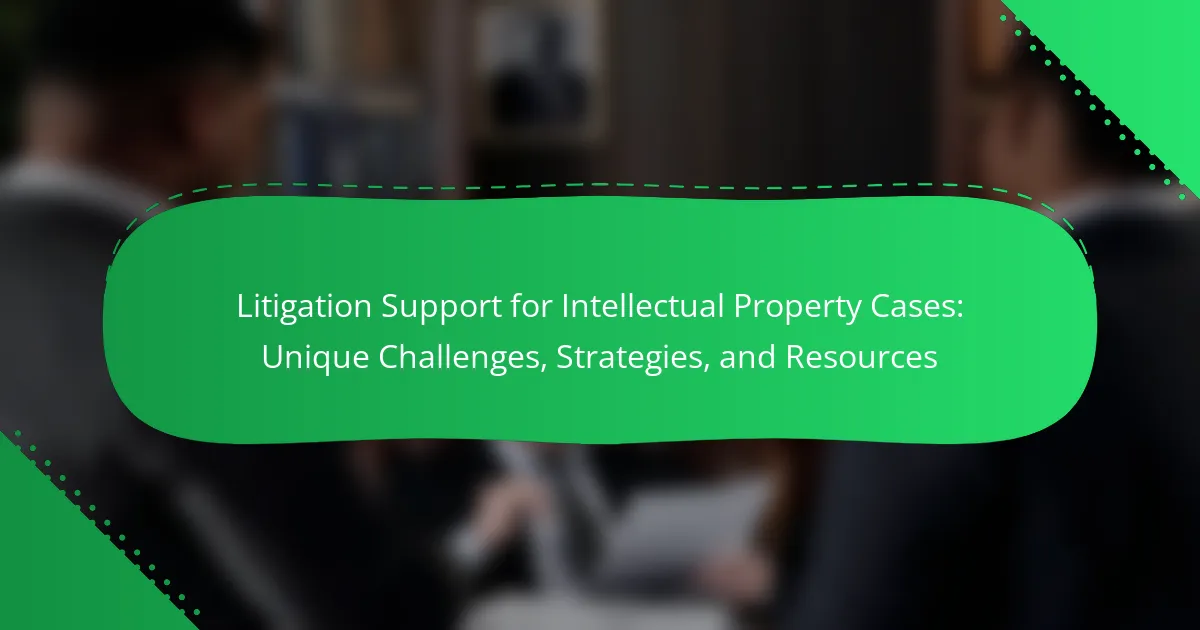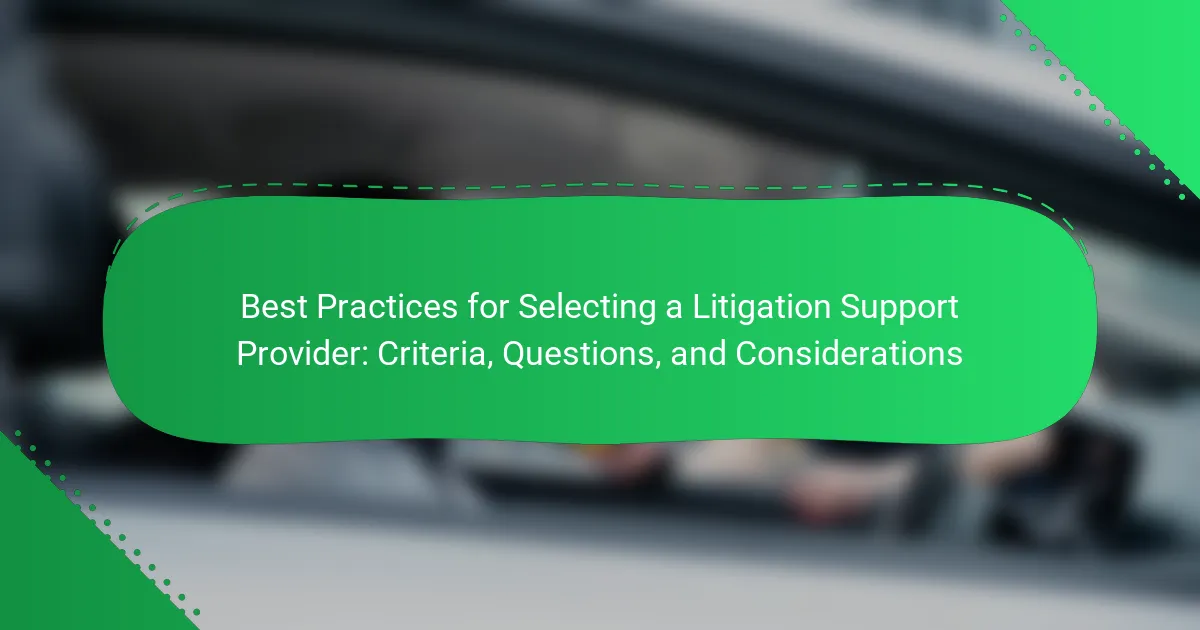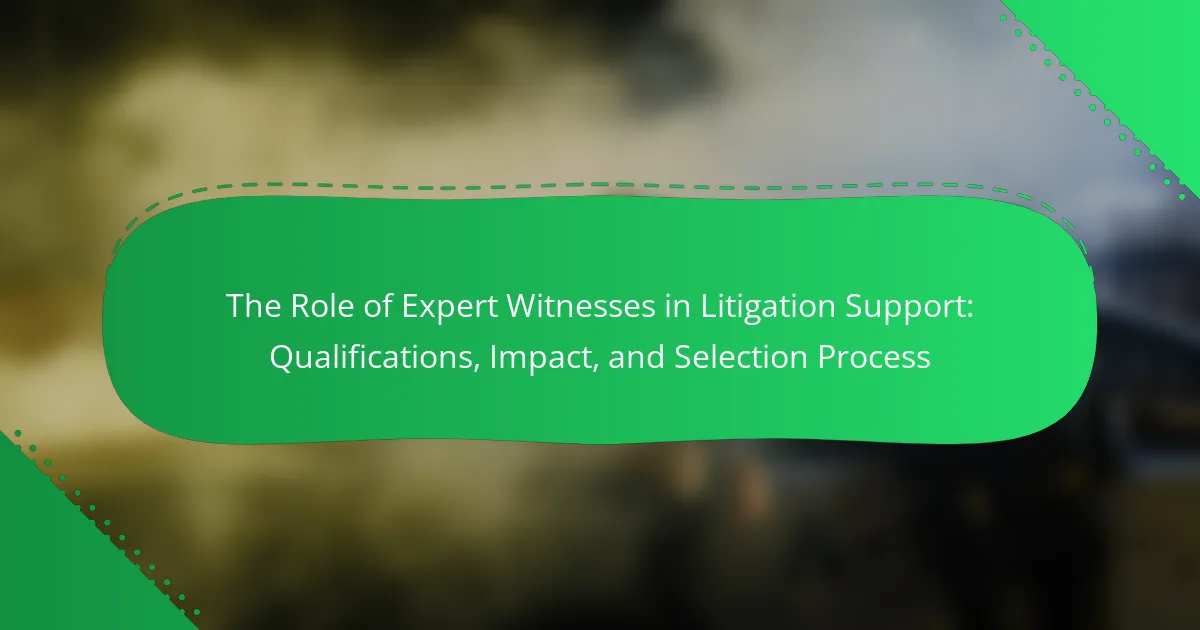Litigation support is a critical service in complex legal cases, providing essential assistance in areas such as document management, data analysis, and expert testimony. This support enhances the efficiency and accuracy of case preparation, allowing legal teams to focus on substantive legal issues rather than administrative tasks. The article highlights the significance of effective litigation support solutions, including technology tools, expert consulting, and document management systems, which collectively improve case outcomes and streamline the litigation process. Additionally, it addresses the role of collaboration among legal teams and the importance of continuous training in litigation support tools to navigate the challenges of complex litigation effectively.
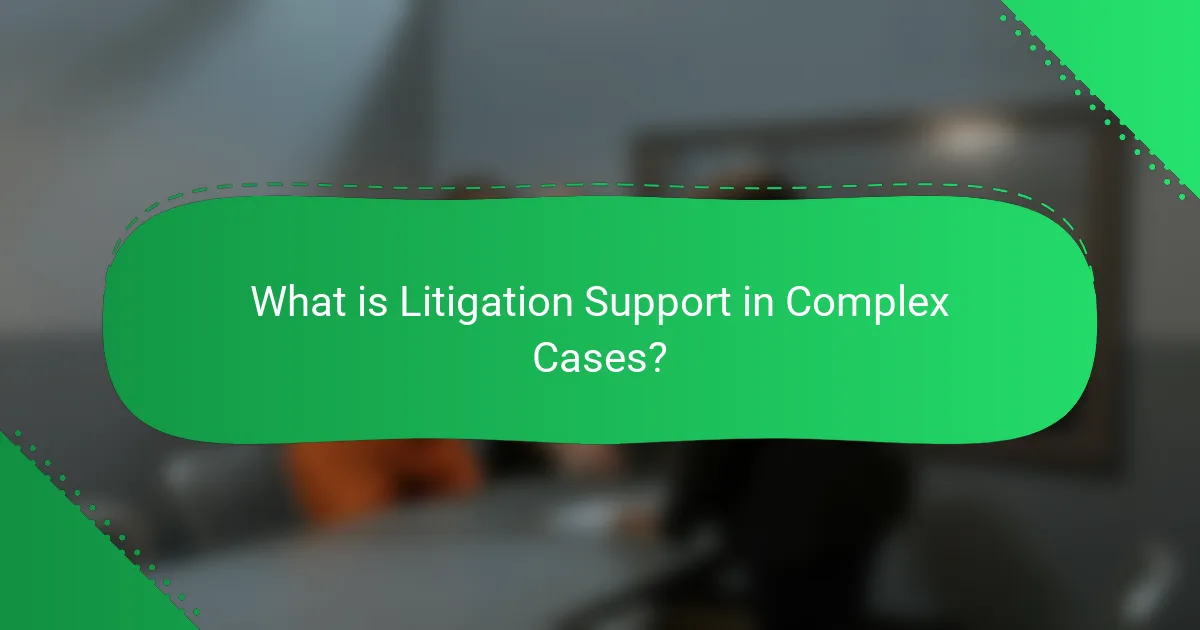
What is Litigation Support in Complex Cases?
Litigation support in complex cases refers to specialized assistance provided during legal proceedings. This support encompasses various services, including document management, data analysis, and expert testimony. Legal teams utilize litigation support to streamline case preparation and enhance strategy development. It is particularly vital in complex cases due to the volume of information involved. Effective litigation support can improve efficiency and accuracy in presenting evidence. Studies indicate that well-organized litigation support can lead to better case outcomes. In complex litigation, the integration of technology for data handling is essential. This approach ensures that legal teams can focus on substantive legal issues rather than administrative tasks.
How does Litigation Support enhance the legal process?
Litigation support enhances the legal process by providing essential resources and expertise. It streamlines case management through organized documentation and evidence handling. Litigation support teams often include legal professionals, paralegals, and technology specialists. They assist in data analysis, which improves the understanding of complex cases. This support can lead to more effective legal strategies and arguments. Furthermore, it ensures compliance with legal standards and regulations. The integration of technology in litigation support can expedite discovery processes. Studies show that firms utilizing litigation support services experience improved case outcomes and client satisfaction.
What specific services are included in Litigation Support?
Litigation support includes a range of services designed to assist legal professionals. Common services are document management, electronic discovery, and expert witness services. Other services include trial preparation and presentation support. Additionally, litigation support may offer legal research and analysis. Financial analysis and forensic accounting are also critical components. These services enhance the efficiency and effectiveness of legal proceedings. They help in organizing case materials and presenting evidence clearly.
How do these services impact case outcomes?
Litigation support services significantly impact case outcomes by enhancing the quality of evidence and analysis presented. These services streamline the discovery process, ensuring that relevant documents are identified and organized efficiently. Improved organization leads to better case preparation and strategy development. Access to expert witnesses can strengthen arguments and provide credibility. Additionally, advanced technology in data analysis allows for more thorough case assessments. According to a study by the American Bar Association, cases with robust litigation support have a higher success rate in court. This demonstrates the essential role these services play in achieving favorable outcomes.
Why is Litigation Support crucial in complex legal matters?
Litigation support is crucial in complex legal matters because it provides essential resources and expertise. These resources include data management, expert testimony, and document analysis. Complex cases often involve large volumes of information. Litigation support helps organize and analyze this data efficiently. It ensures that legal teams can access relevant information quickly. This capability is vital for building strong cases and making informed decisions. Additionally, expert consultants can provide specialized knowledge that enhances legal strategies. The use of litigation support can significantly affect case outcomes, leading to more favorable results for clients.
What challenges do complex cases present that Litigation Support addresses?
Complex cases present several challenges that Litigation Support addresses effectively. These challenges include vast amounts of data that require organization and analysis. Complex cases often involve multiple parties and intricate legal issues. This can lead to difficulties in evidence management and retrieval. Additionally, the technicalities of complex cases may necessitate specialized knowledge and expertise. Litigation Support provides resources to manage these complexities efficiently. It aids in document review, data analysis, and expert witness coordination. By streamlining processes, Litigation Support enhances case preparation and strategy. These services ultimately help legal teams navigate the multifaceted nature of complex cases.
How does Litigation Support mitigate risks in complicated litigation?
Litigation support mitigates risks in complicated litigation by providing specialized resources and expertise. It helps in organizing and managing vast amounts of data efficiently. This support includes document review, data analysis, and expert testimony preparation. By ensuring thorough preparation, litigation support reduces the likelihood of surprises during trial. It also enhances the ability to present evidence clearly and persuasively. Studies show that effective litigation support can improve case outcomes significantly. For instance, a report by the American Bar Association indicates that well-prepared cases have a higher success rate in court. Overall, litigation support is essential for navigating the complexities of legal disputes effectively.

What are the Key Insights into Litigation Support?
Litigation support involves providing assistance in legal cases through various services. Key insights include the importance of document management and organization. Effective data management enhances case strategy and efficiency. Expert witness services are crucial for presenting complex information. Technology plays a vital role in evidence gathering and analysis. Additionally, understanding legal processes helps in navigating challenges. Collaboration among legal teams improves case outcomes. Finally, continuous training in litigation support tools is essential for staying updated.
How do experts view the role of Litigation Support in legal strategy?
Experts view litigation support as a critical component of legal strategy. It enhances case management and decision-making. Litigation support encompasses various services, including document management, data analysis, and expert testimony. These services help attorneys prepare and present their cases effectively. Research shows that effective litigation support can lead to better outcomes in complex cases. For instance, a study by the American Bar Association found that firms utilizing litigation support tools improved their efficiency by up to 30%. This underscores the value of integrating litigation support into legal strategies.
What trends are emerging in Litigation Support services?
Emerging trends in Litigation Support services include increased use of technology, data analytics, and remote collaboration tools. Technology is streamlining document review and case management processes. Data analytics enhances case strategy and outcome predictions. Remote collaboration tools facilitate communication among legal teams and clients. Artificial intelligence is increasingly utilized for e-discovery and legal research. Cloud-based solutions are becoming standard for data storage and access. These trends improve efficiency and reduce costs in litigation support services.
How do technology advancements influence Litigation Support?
Technology advancements significantly enhance litigation support by improving efficiency and accuracy. Modern tools streamline document management, allowing quicker retrieval and analysis. E-discovery software automates the identification of relevant information, reducing manual labor. Advanced analytics provide insights into case trends and outcomes. Artificial intelligence aids in predicting litigation results based on historical data. Cloud-based platforms facilitate collaboration among legal teams, regardless of location. These tools also improve communication with clients, ensuring transparency and timely updates. Overall, technology transforms litigation support, making it more effective and responsive to complex cases.
What are the common challenges faced in Litigation Support?
Common challenges faced in Litigation Support include data management, communication issues, and resource allocation. Data management involves handling large volumes of electronic evidence. This can lead to difficulties in organizing and retrieving relevant information efficiently. Communication issues often arise between legal teams and technical experts. Misunderstandings can delay processes and affect case outcomes. Resource allocation challenges pertain to budget constraints and time limitations. These factors can hinder the ability to provide comprehensive support. Additionally, ensuring compliance with legal standards is critical. Failure to meet these standards can result in sanctions or adverse outcomes.
What obstacles hinder effective Litigation Support?
Obstacles that hinder effective litigation support include inadequate communication, lack of resources, and insufficient training. Inadequate communication can lead to misunderstandings between legal teams and support staff. Lack of resources may result in limited access to necessary technology and personnel. Insufficient training can cause staff to be unprepared for complex cases. These factors can significantly impact the efficiency and effectiveness of litigation support. Studies indicate that poor communication is a leading cause of project failure in legal contexts. Furthermore, resource constraints in law firms have been shown to delay case preparation and increase costs.
How can these challenges be overcome?
Challenges in litigation support can be overcome through strategic planning and resource allocation. Implementing effective communication protocols enhances collaboration among legal teams. Investing in technology, such as case management software, streamlines information organization. Training staff on best practices improves overall efficiency and accuracy. Establishing a clear workflow reduces errors and delays. Regularly reviewing and updating processes ensures adaptability to changing case requirements. Engaging expert consultants can provide specialized knowledge and insights. These strategies collectively enhance the effectiveness of litigation support in complex cases.
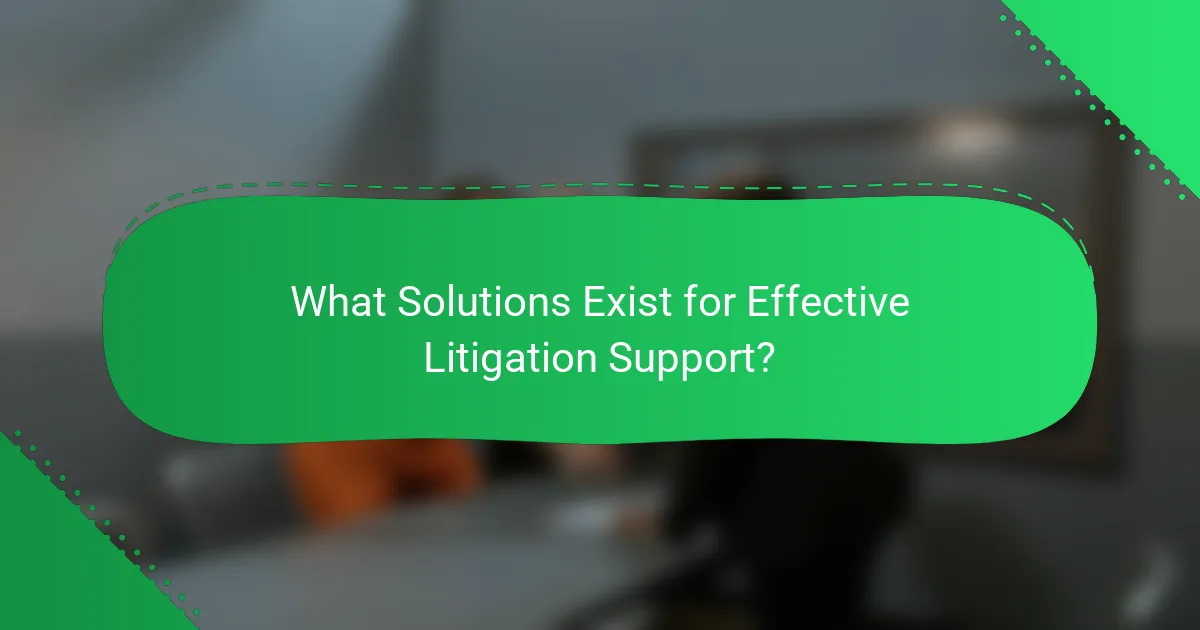
What Solutions Exist for Effective Litigation Support?
Effective litigation support solutions include technology tools, expert consulting, and document management systems. Technology tools, such as e-discovery software, streamline the process of gathering and analyzing evidence. Expert consulting provides specialized knowledge in areas like forensic accounting or technical analysis. Document management systems enhance organization and accessibility of case files. These solutions improve efficiency and accuracy in litigation processes. Studies show that firms using comprehensive litigation support experience faster case resolutions. This indicates the effectiveness of these solutions in complex legal scenarios.
How can firms implement successful Litigation Support strategies?
Firms can implement successful Litigation Support strategies by establishing a clear framework for case management. This includes identifying key personnel and their roles early in the process. Effective communication channels must be set up among team members. Utilizing technology for data management and analysis is essential. Firms should also focus on thorough documentation of all case-related materials. Regular training sessions for staff on legal procedures enhance overall efficiency. Additionally, firms must develop a strategy for identifying and managing risks associated with litigation. Research indicates that firms with structured Litigation Support frameworks experience higher success rates in complex cases.
What best practices should be followed in Litigation Support?
Effective litigation support requires adherence to several best practices. First, maintain clear communication among all parties involved. This ensures everyone is on the same page regarding case strategy and responsibilities. Second, establish a thorough document management system. This system should facilitate easy access to relevant documents and evidence. Third, utilize technology for data analysis and presentation. Tools like e-discovery software can streamline the process and enhance accuracy. Fourth, prioritize confidentiality and data security. Protecting sensitive information is crucial in legal proceedings. Fifth, ensure timely responses to requests for information. Delays can negatively impact case outcomes. Lastly, conduct regular training for the litigation support team. This keeps skills updated and fosters a culture of excellence. Following these practices can significantly enhance the effectiveness of litigation support in complex cases.
How can collaboration enhance Litigation Support effectiveness?
Collaboration enhances Litigation Support effectiveness by fostering communication among legal teams. Effective communication leads to better information sharing and resource allocation. When team members collaborate, they can identify gaps in evidence more efficiently. This collective effort can streamline the discovery process, reducing time and costs. Additionally, collaboration allows for diverse perspectives, which can strengthen case strategies. Research shows that teams that work collaboratively achieve higher success rates in litigation outcomes. A study by the American Bar Association found that collaborative approaches can lead to a 30% increase in favorable verdicts. Thus, collaboration is essential for maximizing the effectiveness of Litigation Support.
What are the future prospects for Litigation Support in complex cases?
The future prospects for litigation support in complex cases are promising. Advancements in technology will enhance data management and analysis. Artificial intelligence will streamline document review processes. Predictive analytics will improve case strategy development. Increased demand for remote services will shape service delivery models. Regulatory changes will require more robust compliance support. The integration of multidisciplinary teams will enhance case outcomes. Overall, these trends indicate a growing reliance on sophisticated litigation support solutions.
What innovations are expected to shape the future of Litigation Support?
Artificial intelligence and machine learning are expected to shape the future of litigation support. These technologies can streamline document review processes. They enhance predictive coding capabilities for case outcomes. Natural language processing will improve legal research efficiency. Blockchain technology may offer secure and transparent evidence management. Cloud-based solutions will enable better collaboration among legal teams. Analytics tools will provide insights into case strategies and trends. These innovations will ultimately lead to cost reductions and faster resolution of cases.
How can legal professionals prepare for changes in Litigation Support?
Legal professionals can prepare for changes in Litigation Support by staying informed about technological advancements. They should regularly attend relevant training sessions and workshops. Engaging with industry publications can provide insights into emerging trends. Networking with peers can facilitate knowledge sharing on best practices. Adopting new software tools can enhance efficiency in case management. Understanding data security protocols is essential for protecting sensitive information. Collaborating with IT specialists can ensure smooth integration of new technologies. Continuous learning is vital as the landscape of litigation support evolves rapidly.
What practical tips can improve Litigation Support effectiveness?
Enhancing litigation support effectiveness involves implementing structured processes. First, establish clear communication among team members. This ensures everyone understands their roles and responsibilities. Second, utilize technology for document management. Effective software can streamline information retrieval and organization. Third, maintain thorough documentation. Accurate records support claims and improve case management. Fourth, conduct regular training sessions. This keeps the team updated on best practices and legal developments. Lastly, foster collaboration with legal counsel. Their insights can guide strategic decisions. These practices have been shown to improve case outcomes and efficiency in litigation support.
Litigation support is a crucial entity in complex legal cases, providing specialized assistance that includes document management, data analysis, and expert testimony. This article outlines the various services involved in litigation support and their impact on case outcomes, emphasizing the importance of technology integration for efficient data handling. It also addresses the challenges faced in complex cases, such as managing vast amounts of information and ensuring compliance with legal standards. Furthermore, the article presents solutions and best practices for effective litigation support, highlighting emerging trends and innovations shaping the future of this essential legal resource.
